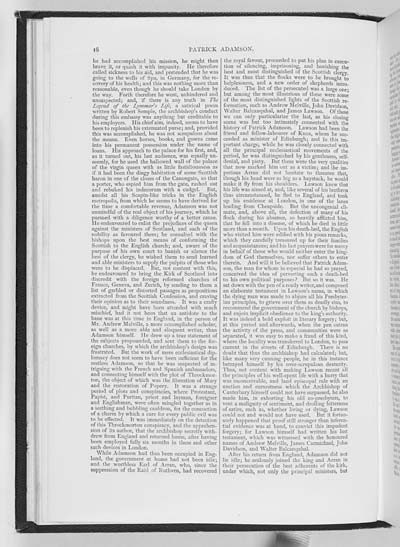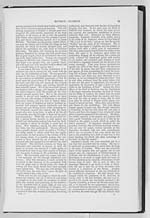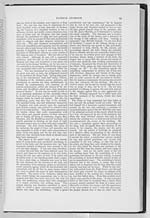18
he had accomplished his mission, he might then
brave it, or quash it with impunity. He therefore
called sickness to his aid, and pretended that he was
going to the wells of Spa, in Germany, for the re-
covery of his health; and this was nothing more than
reasonable, even though he should take London by
the way. Forth therefore he went, unhindered and
unsuspected; and, if there is any truth in The
Legend of the Lymmar's Life, a satirical poem
written by Robert Semple, the archbishop's conduct
during this embassy was anything but creditable to
his employers. His chief aim, indeed, seems to have
been to replenish his extenuated purse; and, provided
this was accomplished, he was not scrupulous about
the means. Even horses, books, and gowns came
into his permanent possession under the name of
loans. His approach to the palace for his first, and,
as it turned out, his last audience, was equally un-
seemly, for he used the hallowed wall of the palace
of the virgin queen with as little fastidiousness as
if it had been the dingy habitation of some Scottish
baron in one of the closes of the Canongate, so that
a porter, who espied him from the gate, rushed out
and rebuked his indecorum with a cudgel. But,
amidst all his Scapin-like tricks in the English
metropolis, from which he seems to have derived for
the time a comfortable revenue, Adamson was not
unmindful of the real object of his journey, which he
pursued with a diligence worthy of a better cause.
He endeavoured to enlist the prejudices of the queen
against the ministers of Scotland, and such of the
nobility as favoured them; he consulted with the
bishops upon the best means of conforming the
Scottish to the English church; and, aware of the
purpose of his own court to banish or silence the
best of the clergy, he wished them to send learned
and able ministers to supply the pulpits of those who
were to be displaced. But, not content with this,
he endeavoured to bring the Kirk of Scotland into
discredit with the foreign reformed churches of
France, Geneva, and Zurich, by sending to them a
list of garbled or distorted passages as propositions
extracted from the Scottish Confession, and craving
their opinion as to their soundness. It was a crafty
device, and might have been attended with much
mischief, had it not been that an antidote to the
bane was at this time in England, in the person of
Mr. Andrew Melville, a more accomplished scholar,
as well as a more able and eloquent writer, than
Adamson himself. He drew up a true statement of
the subjects propounded, and sent them to the for-
eign churches, by which the archbishop's design was
frustrated. But the work of mere ecclesiastical dip-
lomacy does not seem to have been sufficient for the
restless Adamson, so that he was suspected of in-
triguing with the French and Spanish ambassadors,
and connecting himself with the plot of Throckmor-
ton, the object of which was the liberation of Mary
and the restoration of Popery. It was a strange
period of plots and conspiracies, where Protestant,
Papist, and Puritan, priest and layman, foreigner
and Englishman, were often mingled together as in
a seething and bubbling cauldron, for the concoction
of a charm by which a cure for every public evil was
to be effected. It was immediately on the detection
of this Throckmorton conspiracy, and the apprehen-
sion of its author, that the archbishop secretly with-
drew from England and returned home, after having
been employed fully six months in these and other
such devices in London.
While Adamson had thus been occupied in Eng-
land, the government at home had not been idle;
and the worthless Earl of Arran, who, since the
suppression of the Raid of Ruthven, had recovered
the royal favour, proceeded to put his plan in execu-
tion of silencing, imprisoning, and banishing the
best and most distinguished of the Scottish clergy.
It was thus that the flocks were to be brought to
helplessness, and a new order of shepherds intro-
duced. The list of the persecuted was a large one-
but among the most illustrious of these were some
of the most distinguished lights of the Scottish re-
formation, such as Andrew Melville, John Davidson,
Walter Balcanquhal, and James Lawson. Of these
we can only particularize the last, as his closing
scene was but too intimately connected with the
history of Patrick Adamson. Lawson had been the
friend and fellow-labourer of Knox, whom he suc-
ceeded as minister of Edinburgh; and in this im-
portant charge, while he was closely connected with
all the principal ecclesiastical movements of the
period, he was distinguished by his gentleness, self-
denial, and piety. But these were the very qualities
that now marked him out as a victim; and the im-
perious Arran did not hesitate to threaten that,
though his head were as big as a haystack, he would
make it fly from his shoulders. Lawson knew that
his life was aimed at, and, like several of his brethren
thus circumstanced, he fled to England, and took
up his residence at London, in one of the lanes
leading from Cheapside. But the uncongenial cli-
mate, and, above all, the defection of many of his
flock during his absence, so heavily afflicted him,
that he fell into a disease, of which he died in little
more than a month. Upon his death-bed, the English
who visited him were edified with his pious remarks,
which they carefully treasured up for their families
and acquaintances; and his last prayers were for mercy
in behalf of those who would neither enter the king-
dom of God themselves, nor suffer others to enter
therein. And will it be believed that Patrick Adam-
son, the man for whom in especial he had so prayed,
conceived the idea of perverting such a death-bed
to his own political purposes? But so it was. He
sat down with the pen of a ready writer, and composed
an elaborate testament in Lawson's name, in which
the dying man was made to abjure all his Presbyter-
ian principles, to grieve over them as deadly sins, to
recommend the government of the church by bishops,
and enjoin implicit obedience to the king's authority.
It was indeed a bold exploit in literary forgery; but,
at this period and afterwards, when the pen outran
the activity of the press, and communities were so
separated, it was easy to make a fraud of this kind,
where the locality was transferred to London, to pass
current in the streets of Edinburgh. There is no
doubt that thus the archbishop had calculated; but,
like many very cunning people, he in this instance
betrayed himself by his over-scrupulous dexterity.
Thus, not content with making Lawson recant all
the principles of his well-spent life with a hurry that
was inconceivable, and laud episcopal rule with an
unction and earnestness which the Archbishop of
Canterbury himself could not have surpassed, he also
made him, in exhorting his old co-presbyters, to
vent a malignity of sentiment, and drolling bitterness
of satire, such as, whether living or dying, Lawson
could not and would not have used. But it fortun-
ately happened that proof still stronger than inferen-
tial evidence was at hand, to convict this impudent
forgery; for Lawson himself had written his last
testament, which was witnessed with the honoured
names of Andrew Melville, James Carmichael, John
Davidson, and Walter Balcanquhal.
After his return from England, Adamson did not
lie idle; he zealously joined the king and Arran in
their persecution of the best adherents of the kirk,
under which, not only the principal ministers, but�

![]() Universal Viewer |
Universal Viewer | ![]() Mirador |
Large image | Transcription
Mirador |
Large image | Transcription
![]()

